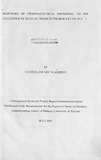| dc.contributor.author | Opiyo, Jacqueline O | |
| dc.date.accessioned | 2013-05-10T12:18:06Z | |
| dc.date.available | 2013-05-10T12:18:06Z | |
| dc.date.issued | 2006 | |
| dc.identifier.citation | Masters of business administration | en |
| dc.identifier.uri | http://erepository.uonbi.ac.ke:8080/xmlui/handle/123456789/21365 | |
| dc.description.abstract | The study set to explore the responses of pharmaceutical importers to the challenge of illegal
trade in pharmaceuticals. It was founded on the premise that pharmaceutical firms are facing
several challenges owing to the liberalization of the industry. The study set to find out the
challenges these firms were facing, specifically as a result of illegal importation of their products
and their medicines being counterfeited. It also identified how the different firms responded to
these challenges.
The research was done by conducting a survey and the findings confirmed that illegal trade in
pharmaceutical products is a growing problem that needs to be addressed. The challenge that was
faced most was that firms had their profit margins reduced as a result of illegal trade. It was
followed by their to address product quality to their customers. Firms were also forced to
lower their medicine prices in order to compete with these illegal medicines. In analyzing the
causes of illegal trade, the study revealed that lack of proper legal and regulatory structures was
seen as the major cause for people to engage in illegal trade. Other causes included the desire for
higher profit margins by some players in the industry and the high cost of medicines.
As a result of the findings. the recommendation made to the Pharmacy ,nd Poisons Board which
is charged with regulating and controlling the industry. was that random monthly inspections be
conducted to identify illegal chemists and those engaging in illegal trade. It was also
recommended that control at customs be enhanced to prevent illegal products getting into the
country and that the government should enact and enforce tougher criminal penalties for those
found trading in illegal medicines.
The recommendations to the pharmaceutical importers was that as major stakeholders in the
industry, they should support the Pharmacy and Poisons Board with human or financial resources
for conducting regular inspections in chemists to ensure that drugs stocked are from authorized
and licensed suppliers. More importantly they should set their medicine prices to suit the
economic situations of different markets and should review their prices to make their medicines more affordable and easily accessible to their customers. They should also carry out public
awareness campaigns to enlighten the public on the dangers of illegal medicines. | en |
| dc.description.sponsorship | University of Nairobi | en |
| dc.language.iso | en | en |
| dc.title | Responses of pharmaceutical importers to the challenge of illegal trade in pharmaceuticals | en |
| dc.type | Thesis | en |
| local.publisher | school of Business, University of Nairobi | en |

